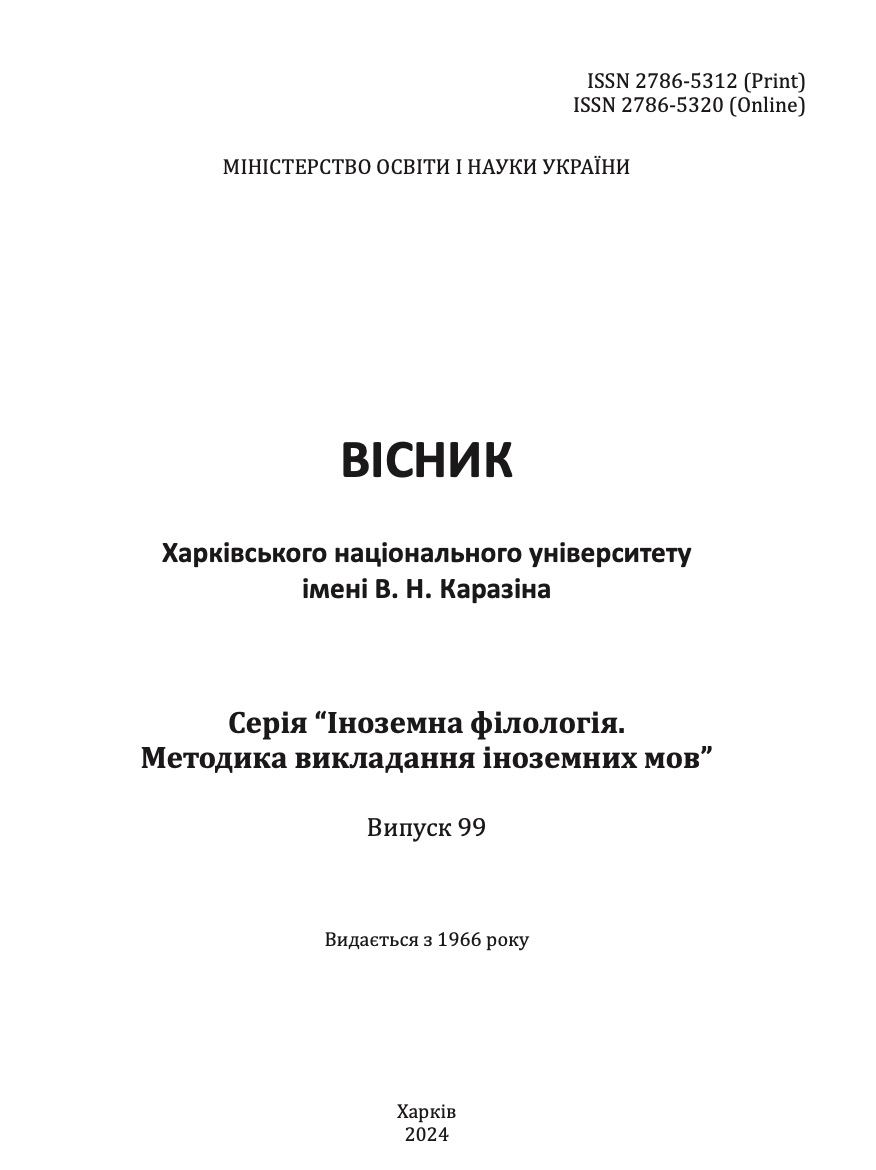Learner agency and its types; application in the language learning environment
Abstract
The article examines student agency as the student’s resource or asset that influences the formation of an individual learning path in foreign language acquisition. Two types of resources are identified: personal – individual characteristics of the student’s intellectual cognitive development, acquired skills, knowledge – and external, economic and social resource, – social, family and educational environment as well as networks. The influence of changes taking place in the learning environment, in particular in language acquisition, and the impact of transformational competencies on the formation and development of agency, student agency, and co-agency are highlighted. Sociological and socio-psychological approaches to defining the concept of agency and the different contexts in which student agency is formed and developed – moral, social, economic, and creative – are outlined. Student agency is defined as an initiative, conscious, self-regulated activity of students aimed at choosing their own learning path in order to achieve personal goals. The types of co-agency within the educational ecosystem are considered; four levels of systemic interaction of educational process stakeholders are distinguished: student-teacher, student-peer, student-family, and student- wider community, and their influence on the formation and development of student agency is emphasized. Based on the theory of structuration and metacognitive strategies that learners favour in the process of organizing language acquisition, the types of student agency used in the language learning environment are differentiated: collaborative, technological, culture-oriented, research, reflexive, self-directed, and action-oriented. The prospect for further research consists in establishing a correlation between the types of student agency and learning tasks in the language classroom
Downloads
References
Bandura, A. (2001). Social cognitive theory: An agentic perspective. Annual Review of Psychology, 52, 1–26. https://doi.org/10.1146/annurev.psych.52.1.1
Bibik, N. M. (2015). Perevahy i ryzyky zaprovadzhennia kompetentnisnoho pidkhodu v shkilnii osviti [Advantages and risks of implementing a competency-based approach in school education]. Ukrainskyi pedahohichnyi zhurnal [Ukrainian Educational Journal], 1, 47–58. https://lib.iitta.gov.ua/9772/1/10-35-1-PB%20(1).pdf
Biesta, G., & Tedder, M. (2007). Agency and learning in the lifecourse: Towards an ecological perspective. Studies in the Education of Adults, 39(2), 132-149.
Bown, J. (2009). Self-regulatory strategies and agency in self-instructed language learning: A situated view. The Modern Language Journal, 93(4), 570-583. https://doi.org/10.1111/j.1540-4781.2009.00965.x
Сampbell, C. (2009). Distinguishing the Power of Agency from Agentic Power: A Note on Weber and the “Black Box” of Personal Agency. Sociological Theory, 27(4), 407-418. https://doi.org/10.1111/j.1467-9558.2009.01355.x
Dweck, C. S. (2006). Mindset: The New Psychology of Success. New York: Random House Publishing Group. https://docs.lib.purdue.edu/cgi/viewcontent.cgi?article=1013&context=giftedchildren
Emirbayer, M., & Mische, A. (1998). What is Agency? American Journal of Sociology, 103(4), 962-1023. https://doi.org/10.1086/231294
Eteläpelto, A., Vähäsantanen, K., Hökkä, P., & Paloniemi, S. (2013). What is agency? Conceptualizing professional agency at work. Educational Research Review, 10, 45-65. https://doi.org/10.1016/j.edurev.2013.05.001
Giddens, A. (1979). Central Problems in Social Theory. Action, Structure, and Contradiction in Social Analysis. London: Macmillan.
Hamid, M., & Baldauf, R. (2011). English and socio-economic disadvantage: learner voices from rural Bangladesh. Language Learning Journal, 39(2), 201-217. https://doi.org/10.1080/09571736.2011.573687
Hitlin, S., & Elder, G. (2006). Agency: an empirical model of an abstract concept. Advances in Life Course Research, 11, 33-67. https://doi.org/10.1016/S1040-2608(06)11002-3 https://sociology.knu.ua/sites/default/files/library/elopen/visnyk03_16.pdf
Humeniuk, V. V. (2020). Agentnist: mnozhynnist vyznachennia ta operatsionalizatsiia v konteksti shkilnoi osvity [Agency: Multiple definitions and operationalization in the context of school education]. Naukovi zapysky NaUKMA. Sotsiolohiia [NaUKMA Research Papers. Sociology], 3, 27–36. https://doi.org/10.18523/2617-9067.2020.3.27-36
Loyal, S., & Barnes, B. (2001). “Agency” as a Red Herring in Social Theory. Philosophy of the Social Sciences, 31, 507-524. https://doi.org/10.1177/004839310103100403
Marope, M., Griffin, P., & Gallagher, C. (2017). Future Competences and the Future of Curriculum. A Global Reference for Curricula Transformation. https://fundaciobofill.cat/uploads/old-files/BOOK_COMPLETE_future_competences_and_the_future_of_curriculum.pdf
Marshall, V. & Clarke, P. (2010). Agency and social structure in aging and life-course research. In D. Dannefer & C. Phillipson (Eds.), The SAGE handbook of social gerontology (pp. 294-305). London: SAGE Publications Ltd. https://doi.org/10.4135/9781446200933.n22
Mercer, S. (2011). Understanding learner agency as a complex dynamic system. System, 39(4), 427-436. https://doi.org/10.1016/j.system.2011.08.001
Nikolaienko, L. (2012). Evoliutsiia perekhodu vid sotsiolinhvistyky do sotsiolohii movy: sotsialno-hrupova struktura suspilstva v dzerkali sotsialnoi struktury movy [The evolution of the transition from sociolinguistics to sociology of language: the social group structure of society in the mirror of the social structure of language]. Visnyk Kyivskoho natsionalnoho universytetu imeni T. Shevchenka [Bulletin of Taras Shevchenko National University of Kyiv], 3, 16–26.
OECD. (2018). The Future of Education and Skills. Education 2030. Published under the responsibility of the Secretary-General of the OECD. https://www.oecd.org/education/2030/E2030%20Position%20Paper%20(05.04.2018).pdf
OECD. (2019). Conceptual Learning Framework. Student Agency for 2030. https://www.oecd.org/education/2030-project/teaching-and-learning/learning/student-agency/Student_Agency_for_2030_concept_note.pdf
Osypchuk, A. D. (2015). Struktura, agentnist ta sotsialna systema v teorii strukturatsii Entoni Hiddensa [Structure, Agency, and Social System in Anthony Giddens’ Structuration Theory]. Hrani [Grani], 12, 74–79.




